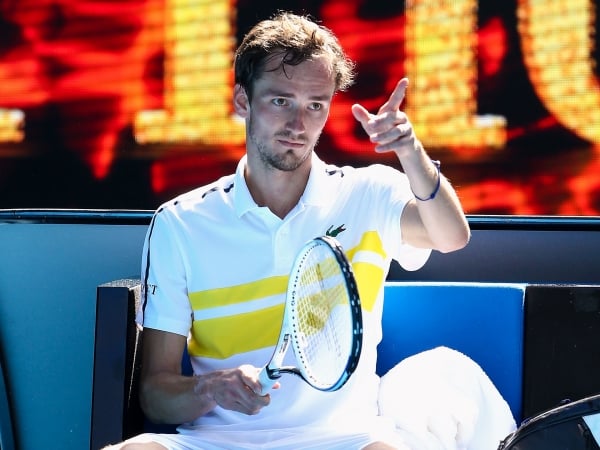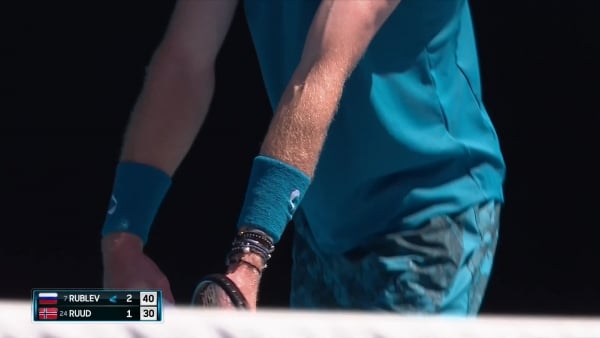Quick to deflect attention, a coy Andrey Rublev swipes his mop of ginger hair to one side as he often does when keen to downplay his latest feat.
The world No.7 was the last piece to complete the puzzle – the first time in the Open Era that three Russian men had reached the quarterfinals at a major.
MORE: Russian revolution excites Hall of Famer Kafelnikov
It is not something he believes he alone should be hailed for.
“I mean it's not me who made it,” Rublev said.
“It's also Daniil [Medvedev] and Aslan [Karatsev]. I was not thinking about it, but if it's like this and it's amazing. If it's never been before and it's first time in history, then it's always something special. In the end we're the first ones, so we'll see what's going to be next.”

What’s next for Rublev is a showdown with his good friend and compatriot Medvedev and after Karatsev became the first qualifier to reach a Grand Slam semifinal on debut, Russia is guaranteed two in the last four.
MORE: Daniil in a rush, Medvedev cruises in quarters
Unlike Karatsev, Rublev and Medvedev have been earmarked to make deep inroads at the Slams, but it is 25-year-old Medvedev who has so far tasted greater success.
Rublev cracked the top 20 last January on the back of a blistering start to the year and broke into the top 10 in October to finish the season at No.8.
He captured a tour-leading five titles in 2020 and tied Novak Djokovic with 41 wins.
Despite back-to-back quarterfinal showings at Roland Garros and Flushing Meadows, he is still in pursuit of that elusive first Grand Slam semifinal.
Against his ATP Cup-winning teammate Medvedev, it will be an uphill battle.
The world No.4 has already reached his first Grand Slam final at the 2019 US Open as well as a semifinal at last year’s US Open before this quarterfinal run at Melbourne Park.
His ATP Finals triumph, in which he defeated the world’s top three – Djokovic, Rafael Nadal and Dominic Thiem – came amid his current 18-match winning streak.
Then there is the pair's head-to-head record, 3-0 in Medvedev’s favour – 4-0 if a qualifying match in 2016 is counted.
He has never dropped a set to his younger countryman, including in last year’s US Open quarterfinals.
“He reads the game really well and it's amazing the patience he has to stay so long in the rallies, to not rush, to take the time, and these things are amazing because in the end these little details, they make him who he is,” Rublev said.
“I take a lesson from that [US Open] match. But now it's going to be new story, new match, we'll see how it's going to be.
“Of course he knows my game, I know his game, but in the end you still need to … see how the things are working or not working, how you're feeling, and then you adapt.”
SBS tennis broadcaster Andrej Bucko has followed the pair’s progression from top juniors to top 10 players and believed Rublev was closing the gap, but still lacked the extraordinary patience of his compatriot.
“Rublev is a different player now,” Bucko said. “When you see him progress you see every year he's climbing up the rankings. He doesn't have ups and downs. He's got the goals, he's got the vision and he's heading that way.
“His problem – unlike Medvedev and this could be so in the match – is he's not that patient. Medvedev, that's why he won, he’s always more patient. Sometimes you’ve got to play a 25-shot rally.”
Bucko said Rublev relished thumping the ball and his average speed of shot was high for someone of such slight stature.
“Top players like Djokovic and Nadal, though, prepare their winning shot, their position,” he said.
“If Rublev improves on that he can do damage to Medvedev. We don't know exactly where Medvedev's health is at after he was treated in that five-set [third-round] match so this is Rublev's best chance. He may win a set or two, but I still expect Medvedev to go through this.”
Despite so much on the line for both, Medvedev dismissed any notion the pair would refrain from talking to each other in the lead-up to their fourth showdown on Tuesday.
“We can talk just before the match,” he said. “Of course during the match we're going to try to win, fight for our best. Sometimes you can maybe even argue on the court or something because we're competitors.
“But after the match we are great friends.”
